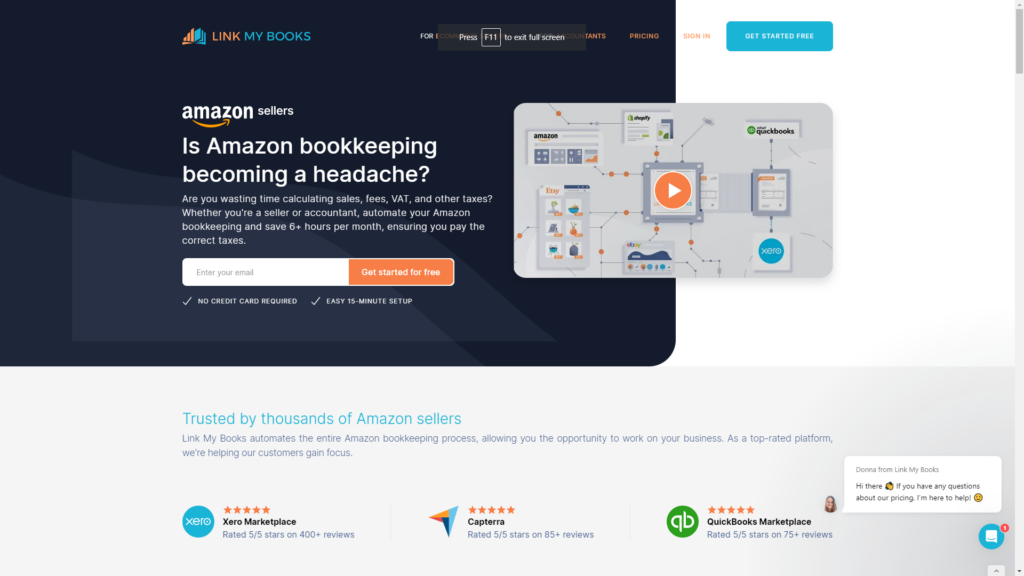Did you know that 64.4% of small business owners use accounting software? Many businesses are opting for accounting software instead of outsourcing their bookkeeping to accounting professionals today. And of course, shedding the shackles of manual accounting processes we were all once subject to.
So why are more businesses opting for the DIY approach to their ecommerce accounting processes?
What are the Characteristics of the Best Accounting Automation Software?
Accounting software is a great option for many ecommerce small businesses, but what exactly makes a good accounting automation software?
You’ll find that different software has different functionalities and capabilities. Here are some characteristics of the best accounting automation software:
Accurately Tracking Your Tax Liabilities
The right accounting automation software solutions will help you to ensure you are paying the correct amount of tax on your sales and reclaiming the right amount on your expenses too.
Ecommerce accounting integration tools help make this a breeze by pulling the data from your sales channels and posting it accurately to your bookkeeping account automatically. More on that later.
Detailed Analytics and Data Insights
Your automated accounting system can give you detailed analytics and data insights. Tracking and analyzing accounting data enables you to take a proactive and methodical approach to managing your business.
For example, the data gathered from accounting automation tools – such as sales revenue, refund ratios, and profitability after fees – can help you make smarter decisions with your marketing efforts, financial planning, and expansion plans.
Cash Flow Forecasting
Accounting automation tools track the cash going in and coming out of your business. Data accuracy is essential for these forecasts, as it will highlight anywhere you can expand or improve your business.
How to Transition to Automated Accounting Software
Opting for automated accounting software over manual accounting or spreadsheets is a big step for any business. It raises the bigger question; how do you implement an automated accounting system?
If you didn’t factor automated accounting software into your ecommerce business plan, don’t worry. Here’s a three-step process to get you up and running:
1. Evaluate Your Current Process
To start with, you must establish where you are with your bookkeeping process. To do this, ask yourself a few questions:
How much time do you spend on your ecommerce bookkeeping?
How often do you perform repetitive tasks?
Do you ever notice errors in your accounts?
Are you 100% confident you’re getting it right?
Once you understand where you are in the process, you can establish the tasks that you need to automate. Data entry, for example, is highly repetitive and time-consuming.
2. Choose Your Software
The software you choose will determine what you can automate. You must also consider how easy the software is to use and integrate with your ecommerce store. Take note of what existing customers are saying in their reviews and what kind of support you can expect from the company behind the software.
3. Connect Your Software
To get the most benefits of accounting automation, you’ll want to connect your accounting software with all your ecommerce sales channels. While accounting software solutions can often be integrated with platforms like Amazon and Shopify, they’re not specifically designed for ecommerce stores.
They tend to import all orders individually and miss out on fees altogether. This makes it almost impossible to reconcile your bank deposits from sales channels with the potentially thousands of orders imported. To fully link your accounts you will need to use specialized software.
How Accounting Automation Can Help Businesses
Saving Costs
Some automated accounting software can be completely free. But even if you choose a paid subscription, using this type of software can save you money. One reason is that both manual and Excel bookkeeping eat up valuable time. Using automated accounting tools allows more time for you to spend running your ecommerce business.
Accounting software also helps significantly reduce the chance of you overpaying taxes. Accounting automation company, Link My Books, recently made the stark discovery that 75% of their Amazon seller clients had previously overpaid in taxes due to a lack of correct separation of sales, fees, and more.
It Helps Avoid a Cash Flow Crisis
Automated accounting tools do more than just save you money; they can help avoid a cash flow crisis. By using automated accounting tools, businesses can keep on top of what needs to be paid and when.
Accounting automation software can also allow you to send automatic payment reminders to clients when their invoice is due. Additionally, customers can set up automatic recurring payments to make sure their invoice is paid on time, every time.
Greater Accuracy
Using accounting automation software, businesses enjoy greater accuracy of their expenses, taxes, and sales. Even professional accountants can make mistakes when they’re doing everything by hand.
The beauty of accounting software is it doesn’t miscalculate, doesn’t misplace valuable data, and it doesn’t make mistakes due to tiredness, brain fog, or any other ailment that can impact someone’s ability to concentrate. This ultimately leads to better, more accurate accounts.
Faster Data Retrieval
If you’re doing your accounts manually and you need to find something, what’s your process? You might have a filing system, perhaps one where your files are placed in date order. Or perhaps in alphabetical order according to your clients’ names? To retrieve data, you then need to sift through the appropriate file to find what you need.
Automated accounting is much simpler. You simply type in a tag or the name of the file you’re looking for, and it’s presented to you within a click or two of your mouse.

Are you Ready for an Automated Accounting System?
The case for moving to automated accounting is strong. Account automation will save you time, money, and provide more accurate accounts. Plus, you can use your newfound data to drive your business forward toward optimal growth.
If you’re interested in getting started with automated accounting systems, reach out to Link My Books and say goodbye to spending hours on your ecommerce bookkeeping. Start a free 14-day trial or book a demo today.
